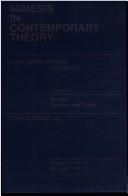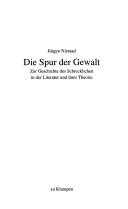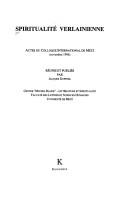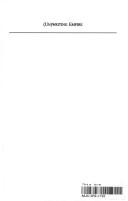| Listing 1 - 10 of 8863 | << page >> |
Sort by
|

ISBN: 3518414542 9783518414545 Year: 2003 Publisher: Frankfurt am Main Suhrkamp
Abstract | Keywords | Export | Availability | Bookmark
 Loading...
Loading...Choose an application
- Reference Manager
- EndNote
- RefWorks (Direct export to RefWorks)
Collection of previously published texts about Switzerland from various works by Robert Walser.
German literature --- Switzerland --- In literature --- In literature. --- Switzerland - In literature
Book
ISBN: 9023218736 9789023218739 Year: 1982 Volume: 11 Publisher: Assen Van Gorcum
Abstract | Keywords | Export | Availability | Bookmark
 Loading...
Loading...Choose an application
- Reference Manager
- EndNote
- RefWorks (Direct export to RefWorks)
Thematology --- Grotesque in literature. --- Grotesque in literature
Book

ISBN: 9055017906 9789055017904 Year: 2000 Volume: 275 Publisher: Den Haag BZZTôH
Abstract | Keywords | Export | Availability | Bookmark
 Loading...
Loading...Choose an application
- Reference Manager
- EndNote
- RefWorks (Direct export to RefWorks)

ISBN: 1283424711 9786613424716 9027280118 9789027280114 9780915027132 0915027135 9780915027149 0915027143 9789027242242 9027242240 0915027135 0915027143 9027242232 9027242240 9789027242235 9781283424714 6613424714 Year: 1984 Publisher: Amsterdam
Abstract | Keywords | Export | Availability | Bookmark
 Loading...
Loading...Choose an application
- Reference Manager
- EndNote
- RefWorks (Direct export to RefWorks)
After almost two hundred years of relative obscurity mimesis finds itself again in the limelight of Western theoretical discourse. In the Anglo-American tradition, mimesis or 'imitation' regained some prominence, at the turn of the century, through S.H. Butcher's translation of and introduction to Aristotle's Poetics, and , in the thirties, through the work of the Chicago school, also centered around Aristotle. More recently, mimesis looms large in the work of Auerbach, Burke and Frye.
Mimesis in literature. --- Representation (Literature) --- Imitation in literature --- Realism in literature --- Literary semiotics --- Mimesis in literature
Book
ISBN: 9780691230641 9780691230634 0691230641 Year: 2022 Publisher: Princeton, N.J. Princeton University Press
Abstract | Keywords | Export | Availability | Bookmark
 Loading...
Loading...Choose an application
- Reference Manager
- EndNote
- RefWorks (Direct export to RefWorks)
"How decolonization and the cold war influenced literature from Africa, Asia, and the Caribbean. How did superpower competition and the cold war affect writers in the decolonizing world? In The Aesthetic Cold War, Peter Kalliney explores the various ways that rival states used cultural diplomacy and the political police to influence writers. In response, many writers from Africa, Asia, and the Caribbean--such as Chinua Achebe, Mulk Raj Anand, Eileen Chang, C.L.R. James, Alex La Guma, Doris Lessing, Ngũgĩ wa Thiong'o, and Wole Soyinka-carved out a vibrant conceptual space of aesthetic nonalignment, imagining a different and freer future for their work. Kalliney looks at how the United States and the Soviet Union, in an effort to court writers, funded international conferences, arts centers, book and magazine publishing, literary prizes, and radio programming. International spy networks, however, subjected these same writers to surveillance and intimidation by tracking their movements, tapping their phones, reading their mail, and censoring or banning their work. Writers from the global south also suffered travel restrictions, deportations, imprisonment, and even death at the hands of government agents. Although conventional wisdom suggests that cold war pressures stunted the development of postcolonial literature, Kalliney's extensive archival research shows that evenly balanced superpower competition allowed savvy writers to accept patronage without pledging loyalty to specific political blocs. Likewise, writers exploited rivalries and the emerging discourse of human rights to contest the attentions of the political police.A revisionist account of superpower involvement in literature, The Aesthetic Cold War considers how politics shaped literary production in the twentieth century"--
Book
ISBN: 8433819623 Year: 1994 Publisher: Granada Universidad de Granada
Abstract | Keywords | Export | Availability | Bookmark
 Loading...
Loading...Choose an application
- Reference Manager
- EndNote
- RefWorks (Direct export to RefWorks)
Alemán, Mateo --- Beggars in literature. --- Merchants in literature.

ISBN: 3924245320 Year: 1994 Publisher: Lüneburg Klampen
Abstract | Keywords | Export | Availability | Bookmark
 Loading...
Loading...Choose an application
- Reference Manager
- EndNote
- RefWorks (Direct export to RefWorks)
Comparative literature --- Thematology --- Horror in literature. --- Violence in literature.

ISBN: 2252031719 9782252031711 Year: 1997 Volume: 54 Publisher: Paris Klincksieck
Abstract | Keywords | Export | Availability | Bookmark
 Loading...
Loading...Choose an application
- Reference Manager
- EndNote
- RefWorks (Direct export to RefWorks)
Book
ISBN: 3770530322 Year: 1995 Publisher: München Fink
Abstract | Keywords | Export | Availability | Bookmark
 Loading...
Loading...Choose an application
- Reference Manager
- EndNote
- RefWorks (Direct export to RefWorks)
Döblin, Alfred --- Mental illness in literature. --- Psychiatry in literature.

ISBN: 9042004614 9042004711 9004433597 Year: 1998 Publisher: Amsterdam Rodopi
Abstract | Keywords | Export | Availability | Bookmark
 Loading...
Loading...Choose an application
- Reference Manager
- EndNote
- RefWorks (Direct export to RefWorks)
The contributors to the present volume, in espousing and extending the programme of such writers as Edward Said, Benedict Anderson, Homi Bhabha, and Gayatri Spivak, lay bare the genealogy of 'writing' empire (thereby, in a sense, ' un -writing' it). One focus is the Caribbean: the retrograde agenda of francophone crolit ; the re-writing of empire in the postmodern disengagement of Edouard Glissant; resistance to post-colonial allegiances, and the dissolving of binary categories, in contemporary West Indian writing. Essays on India, Malaysia, and Indonesia explore various aspects of cultural self-understanding in Asia: un-writing high culture through hybrid 'shopping' among Western styles; the use of indigenous oral forms to counter Western hegemony; romantic and anti-romantic attitudes towards empire and the land. A shift to Africa brings a study of Nadine Gordimer's feminist un-writing of Hemingway's masculinist colonising narrative, a searching analysis of Soyinka's restoration of ancient syncretic elements in his West African re-visions of Greek tragedy, changing evaluations of the validity of European civilization in Andr Gide's representations of Africa, and tensions of linguistic allegiance in Maghreb literature. North America, finally, is brought back into the imperial fold through discussions of Melville's re-writing of travel and captivity narratives to critique the mission of American empire, Leslie Marmon Silko's re-territorialization of expropriated Native American oral traditions, and Timothy Findley's representation of Canada's troubled involvement with its three shaping empires (French, British, American).
Comparative literature --- Thematology --- Imperialism in literature. --- Decolonization in literature.
| Listing 1 - 10 of 8863 | << page >> |
Sort by
|

 Search
Search Feedback
Feedback About UniCat
About UniCat  Help
Help News
News